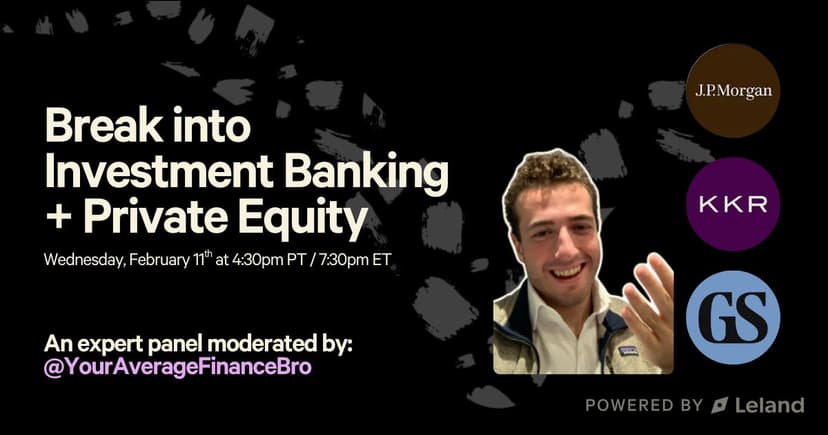What is Private Equity and How Does It Work?
Our guide to an often mentioned but seldom understood industry, complete with top MBA programs for PE and careers in PE.
Posted April 10, 2025

Join a free event
Learn from top coaches and industry experts in live, interactive sessions you can join for free.
Table of Contents
What is Private Equity?
Private equity (PE) is a form of private financial investment, which typically comes from a PE firm or established investor. Money is given in return for a stake in the company, usually a majority stake. The goal of PE firms is to turn the company around and resell it for a profit, unlike venture capital where the firms are invested in the long-term success of the companies.
There are three main actors involved in private equity investments: the private equity firm, the investors who give their money to the firm, and the companies in which the firm invests the money. Private equity is considered an alternative asset class, like venture capital. These kinds of investments are not as easily accessible or as public as stocks and bonds.
Some of the most well-known PE firms include Blackstone Group, Warburg Pincus, TPG Capital, and Carlyle Group.
How Does Private Equity Work?
In order to raise capital, private equity firms will open up a fund in which individuals can invest their money. These investors are known as “limited partners.” The PE firm then takes that money and invests it into companies, usually ones that are stagnant or doing poorly, but that still have potential for growth. The firm will take a majority share and then work to improve the company in order to resell it for a profit.
The most common type of PE funding is known as a Leveraged Buyout or LBO. In an LBO, the firm will completely buy out a company using a combination of equity and debt financing. After it has bought out the company, it will try to increase its profit and overall health through a variety of approaches, including changing growth strategies, cutting employees, or replacing management. Other types of private equity funding include distressed funding, fund of funds, venture capital, and real estate private equity.
The financial structure of private equity firms typically follows a 2-20 rule. PE firms will charge a 2% annual management fee on assets under management (or AUM) that covers the daily expenses of the firms. A second fee, called the performance fee, is used to incentivize returns and is typically calculated as 20% of the gross profits from a company’s sales. The rest goes back to the limited partners who provided the capital for the original investment. The combination of the management fee and performance fee is where the large majority of a private equity firm’s profits come from.
What is the Difference Between Venture Capital and Private Equity?
Venture capital is a form of private equity. PE is more general because it refers to the many different types of investments that firms and individuals can make in private companies. Venture capital investments focus more on start-ups and early-stage companies, while private equity encompasses companies at all stages and in all industries.
Read more about venture capital here: What is Venture Capital and How Does it Work?
Careers in Private Equity
Private equity is a competitive industry with many undergraduates and post-MBAs vying for a select role. Similar to venture capital, most entry-level jobs in PE firms are analyst or associate positions. Analysts are the lowest on the PE totem pole and the work is mostly composed of researching potential deals, reviewing investments, and monitoring the firm’s portfolio. PE associates work closely with senior associates and partners during the entire process of finding companies, monitoring the investment process, and strategizing exits. Their roles may include analytical modeling, reviewing confidential information memorandum (CMIs), fundraising, and portfolio company monitoring. Generally, PE firms do not hire individuals directly out of their undergraduate degrees unless they have several years of experience in the industry. Applicants with a history in investment banking, corporate restructuring, and strategic consulting are more competitive.
Top MBA Programs for Private Equity
Private equity is a subset of finance and as such, the MBA programs that offer concentrations in finance will typically be more helpful for MBA candidates that want to go into private equity. From an overall perspective, to get into a top private equity firm, you need to go to a top business school. Attending any of the M7 programs will make applicants more competitive, although the schools with the highest percentage of graduates in private equity are Stanford GSB, and Harvard Business School by a large margin. According to the school websites, the percentage of the 2021 class that entered the private equity industry after graduation is as follows, ranked from most to least:
Stanford GSB: 15%
Average Salary: $176,946
Harvard Business School: 14%
Median Salary: $160,000
Columbia Business School: 4.1%
Median Salary: $147,500
Kellogg School of Business: 5.6%
Average Salary: $164,375
Sloan School of Management: 3.5%
Average Salary: $158,800
The Wharton School: 3.4%
Average Salary: $157,500
Booth School of Business: 6.8%
Median Salary: $150,000
Though the post-MBA employment reports can play some role in deciding where to pursue an MBA, generally all the top MBA programs will situate their students well for roles in highly-competitive industries like private equity.
Final Note
Leland provides you with the content, community, and coaching that you need to get into your dream career and accomplish other ambitious goals. Sign up today to gain access to additional free resources, community events, small group classes, world-class coaching, and more.
Browse hundreds of expert coaches
Leland coaches have helped thousands of people achieve their goals. A dedicated mentor can make all the difference.




















